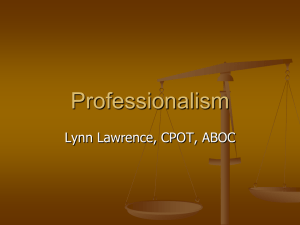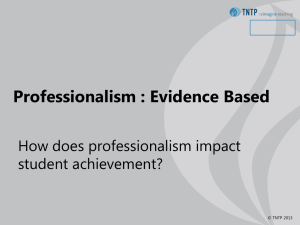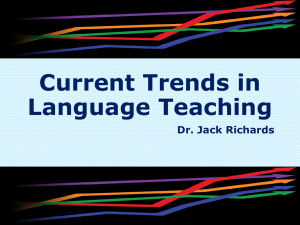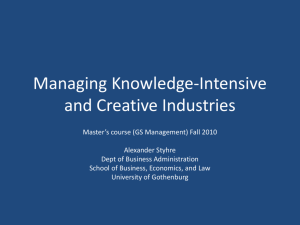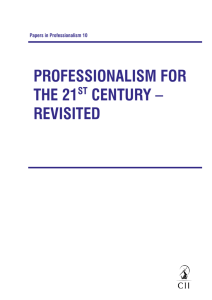Seminar 6 Abstracts - Teaching and Learning Research Programme
advertisement
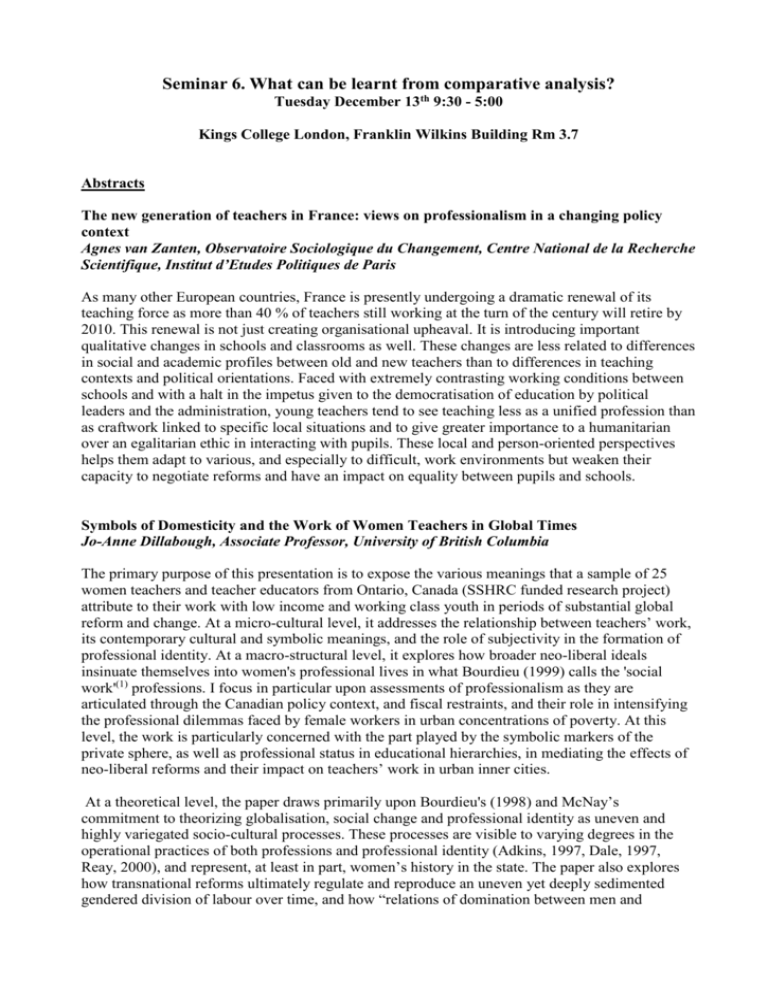
Seminar 6. What can be learnt from comparative analysis? Tuesday December 13th 9:30 - 5:00 Kings College London, Franklin Wilkins Building Rm 3.7 Abstracts The new generation of teachers in France: views on professionalism in a changing policy context Agnes van Zanten, Observatoire Sociologique du Changement, Centre National de la Recherche Scientifique, Institut d’Etudes Politiques de Paris As many other European countries, France is presently undergoing a dramatic renewal of its teaching force as more than 40 % of teachers still working at the turn of the century will retire by 2010. This renewal is not just creating organisational upheaval. It is introducing important qualitative changes in schools and classrooms as well. These changes are less related to differences in social and academic profiles between old and new teachers than to differences in teaching contexts and political orientations. Faced with extremely contrasting working conditions between schools and with a halt in the impetus given to the democratisation of education by political leaders and the administration, young teachers tend to see teaching less as a unified profession than as craftwork linked to specific local situations and to give greater importance to a humanitarian over an egalitarian ethic in interacting with pupils. These local and person-oriented perspectives helps them adapt to various, and especially to difficult, work environments but weaken their capacity to negotiate reforms and have an impact on equality between pupils and schools. Symbols of Domesticity and the Work of Women Teachers in Global Times Jo-Anne Dillabough, Associate Professor, University of British Columbia The primary purpose of this presentation is to expose the various meanings that a sample of 25 women teachers and teacher educators from Ontario, Canada (SSHRC funded research project) attribute to their work with low income and working class youth in periods of substantial global reform and change. At a micro-cultural level, it addresses the relationship between teachers’ work, its contemporary cultural and symbolic meanings, and the role of subjectivity in the formation of professional identity. At a macro-structural level, it explores how broader neo-liberal ideals insinuate themselves into women's professional lives in what Bourdieu (1999) calls the 'social work'(1) professions. I focus in particular upon assessments of professionalism as they are articulated through the Canadian policy context, and fiscal restraints, and their role in intensifying the professional dilemmas faced by female workers in urban concentrations of poverty. At this level, the work is particularly concerned with the part played by the symbolic markers of the private sphere, as well as professional status in educational hierarchies, in mediating the effects of neo-liberal reforms and their impact on teachers’ work in urban inner cities. At a theoretical level, the paper draws primarily upon Bourdieu's (1998) and McNay’s commitment to theorizing globalisation, social change and professional identity as uneven and highly variegated socio-cultural processes. These processes are visible to varying degrees in the operational practices of both professions and professional identity (Adkins, 1997, Dale, 1997, Reay, 2000), and represent, at least in part, women’s history in the state. The paper also explores how transnational reforms ultimately regulate and reproduce an uneven yet deeply sedimented gendered division of labour over time, and how “relations of domination between men and women” serve as one “strategic nexus” supporting the movement and success of global reforms in education. In summary, the paper documents the tensions between doing ‘women’s work’ as defined by a historical and largely artificial private and the struggle to ‘become’ professionals in the realm of the traditionally defined, yet newly reconstituted, transnational public. What is the nature of these tensions in urban sites with substantial ethnic, class and gender conflict? What kind of history must we understand if we are to understand the current status of women’s work in schools and higher education, especially in those ‘social work’ professions, which lack an elite history? --------------I borrow Bourdieu’s (1999) term, “social work profession”, to explore the working lives of those who have been seen as cultivators of the ‘public good’ rather than simply suggesting that teacher education is a straightforwardly feminized profession. While teacher education has substantial links to the feminization of labour (particularly in training primary teachers), the history of women’s work in teacher education is varied and contingent on the structure and opportunities afforded to women in different sites and in different eras. Teacher Roles, Identities and Professionalism: Lessons from the Comparative Study of Africa Clive Harber, University of Birmingham This paper examines the issue of teacher professionalism in Africa in the sense of the extent to which teachers actually do what is expected of them in their role as teacher and how there are different ideological interpretations of what it means to act professionally. It explores the notion of teacher as professional authoritarian, the interpretation of teacher professionalism in ‘prismatic’ societies, the teacher as a sometimes violent professional and the teacher as democratic professional. It uses South Africa as case study of how existing teacher identities and roles interact with attempts to create democratic forms of professionalism and then discusses the role of teacher education in developing (or not) democratic professionalism. The paper concludes with a discussion of the school inspector as potential democratic professional using a project in The Gambia as a case study. Peculiarities of the English? International policy orthodoxy and ‘national cultures’ of teaching. Ken Jones, Keele University Post-1945 educational cultures in England are internally more diverse than those of Wales and Scotland: radical and conservative elements are alike accentuated (Jones 2003). These cultures have shaped, and been shaped by, the practices of teachers – both at the level of organised trade union activity and at that of the associational practice that has contributed to curricular and pedagogic change. International policy orthodoxy – ‘travelling policy’ – seeks to remake both the work of teachers and the social relationships characteristic of wider professional activity. But orthodoxy is not, as it were, inscribed on blank and receptive surfaces: it is modulated by local circumstance, and takes different forms in different places. The paper explores the varying modulations of teacher-related policy orthodoxy in British context(s). In doing so, it intends – through comparison with Wales and Scotland – to establish the specificities of the embedded cultures of teaching in England, and of the ways in which they have been subject to policy-directed change. The state(s) of teaching in Australia: the slow erosion of professional knowledges and identities? Pat Thomson, University of Nottingham The recent development of innovative curricula in two Australian states, Queensland and Tasmania, and the continued presence of school-based professional development programmes might suggest that the there is nothing to worry about in Australian schools. However the establishment of the National Institute for Quality Teaching and School Leadership, with its projects on standards for the teaching profession and its ‘new world class leadership development program, designed and delivered by The Hay Group in conjunction with The University of Melbourne … to improve the skills of school leaders from all over Australia’ has a depressingly familiar ring. And what is actually happening in funded professional development programmes for teachers seems heavily influenced by ‘learning styles’ and ‘multiple intelligences’. In this paper I present an historical view of federal state negotiations over teaching and teachers and show that an anti teacher union politics have fuelled an ongoing attempt to corral professional conversations. This has been accompanied by systematic spin about outstanding individual teachers and a tarnished teaching profession. Tradition, culture and identity in the reform of teachers' work in Scotland and England Ian Menter, Chair of Teacher Education, University of Glasgow In an earlier paper written with English colleagues,(1) we suggested that the modernisation of the teaching workforces in Scotland and England, while sharing some features of a global agenda towards standardisation, nevertheless demonstrates significant differences. Simply put, we contrasted the ‘developmental’ approach to teaching reform in Scotland, with the performative and ‘assessment-oriented’ approach in England. Drawing on an ESRC funded study of Threshold Assessment of teachers in England, we compared the Threshold process with the process of becoming a Chartered Teacher in Scotland. Both of these are policies which relate to teachers who have completed or are completing the first stage in their careers. In this paper I will draw on a wider range of studies to explore and develop this theme further.(2) However, in developing the focus on teacher identity in national cultural contexts, I will also draw on some sources that go beyond a ‘conventional’ sociology of education, incorporating for example, insights from literature, film and drama, in order to explore the extent to which such ‘texts’ may complement or amplify the insights previously gained. In seeking to relate this wider range of sources to questions of teacher identity and professionalism, I will make use of Raymond Williams’ concept of ‘structures of feeling’. In so doing, I start to address the complex relationships between identity, culture and society that may help us to assess the significance of some of the apparent differences in teacher identity in the two countries in which I have worked as an educator and researcher myself. -----------Menter, I., Mahony P. and Hextall I. (2004) ‘Ne’er the twain shall meet? The modernisation of the teaching workforce in Scotland and England’. Journal of Education Policy , 19 (2), 195-214. 2 The studies that I expect to draw upon include: Evaluation and Impact Study of the Headteacher Induction Programme, commissioned by the National College for School Leadership (England), Evaluation of the Scottish Qualification for Headship, the evaluation of the Columba 1400 Leadership Academy and a study of Supply Cover in the Teaching Profession, all commissioned by the Scottish Executive Education Department, as well as a Paisley University funded comparative study of initial teacher education in Scotland and England.


